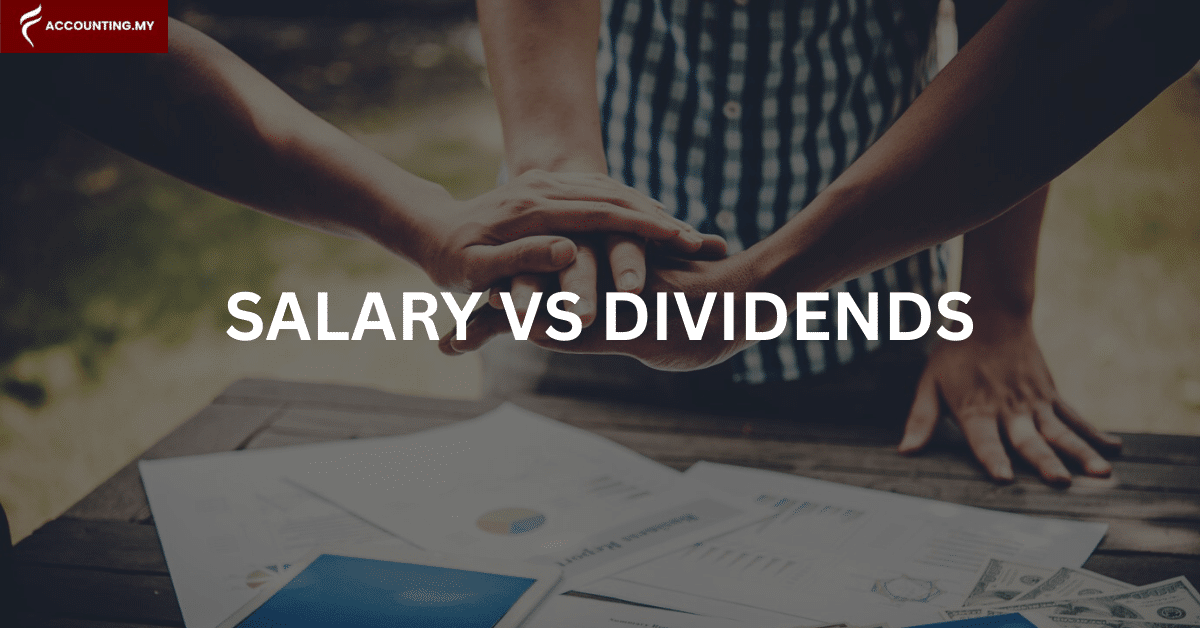Deciding how to take money out of your own company or business can be a head scratcher. You poured blood, sweat and tears and you built something great! Now it’s time to enjoy the fruits of your labour and smell that sweet reward.
But should that come as a regular payment, a share of the profits, or a mix of both? This isn’t just about the amount you pocket, it has a real impact on the taxation and long-term financial plans, and the overall health of your business.
Understanding the difference between drawing a salary and taking dividends is key. Each has its own set of rules, especially when it comes to the taxman (affectionately known as LHDN). Getting this right can save you money and headaches down the line.
What’s the Difference Between Salary and Dividends
Let’s keep it straightforward:
- Salary: This is a fixed, regular payment you receive as an employee or director of your company. It’s basically a wage slip you’d get if you worked for someone else.
- Dividends: These are payments made to the owners (shareholders) of a company from its profits. They aren’t a regular payment and depend on how well the business is doing.
The Tax Angle: A Big Consideration
The way Malaysia treats salary tax and the tax on dividends is quite different, and this is where things get interesting.
Salary
When you take a salary from your company, it’s generally treated as your personal income. This means it’s subject to the usual income tax rates. On top of that, there are often other deductions like contributions to EPF and SOSCO.
The good news for the business is that the salary paid is usually seen as a business expense, which can reduce the company’s taxable profit.
Dividends
Dividends work differently. The company first pays corporation tax on its profits. Then, any remaining profit can be distributed to the owners as dividends. The tax you pay on these dividends can vary and might be different from the income tax rates on a salary. It’s worth noting that the rules around taxing dividends can change, so keeping an eye on the current regulations is important for any business owner tax planning.
Why This Matters to Business Owners
As a business owner, you have a difficult choice to make. Deciding between a salary and dividends (or a combination) can affect:
- Personal tax bill: Depending on your income level and the current tax rules, one might be more tax-efficient than the other.
- Company’s finances: Salaries are an expense that reduces profit, while dividends are paid out of after-tax profit.
- Retirement planning: Taking a salary often involves contributions to a retirement fund (EPF), which might not be the case with dividends.
- Cash flow: Regular salary payments provide a steady income, while dividends depend on profits being available.
Benefits of Choosing a Salary
Opting for a salary comes with some solid advantages, particularly if you appreciate a bit of financial predictability and have an eye on your future. Let’s take a closer look:
- The Comfort of Consistent Income: A salary provides a regular, dependable income stream. This makes managing your personal finances, planning for those bigger purchases, and generally sleeping soundly at night a tad easier.
- Building Your Nest Egg: Salary payments mean you’re contributing to your EPF. While less cash on hand, it’s a disciplined way to save for your retirement, with a little help along the way.
- A Tax Break for Your Business: Here’s a clever bit: the salary you draw is usually considered a proper business expense. This can actually lower your company’s taxable profit, which is a win-win.
Benefits of Choosing Dividends
Even with the recent adjustments to dividend tax, taking a share of the profits can still have its perks, especially depending on your financial picture.
- Flexibility in Your Pocket: Unlike the fixed nature of a salary, dividend payments can fluctuate with how well the company is doing. This gives you some wiggle room and the ability to take more when things are booming.
- Kinder to Your Tax Bill: Depending on your overall income and the current tax relief rules, dividends can sometimes be taxed at a more agreeable rate compared to salary. It’s worth keeping an eye on this, as it can mean a bit more of the profits stays with you.
- No Compulsory Contributions: Dividends don’t come with mandatory contributions like EPF or SOCSO. While planning for the future is still key, this gives you more say in where your money goes and the investment choices you make.
How Your Business Setup Plays a Part
The way your business is structured actually has a noticeable influence on how you can take money out, especially when we talk about salaries and dividends. It’s good to have a basic understanding of this:
Sole Proprietorship
If you’re running things as a sole trader, the concept of a formal salary like an employee gets isn’t really in play. Instead, when you take money out of the business for yourself, it’s usually referred to as an owner’s draw.
This money is essentially considered part of your personal income and is taxed as such. Dividends, being a distribution of company profits to shareholders, don’t apply here since there aren’t separate shareholders.
Partnership
Similar to sole proprietorships, partners typically take “drawings” from the partnership’s profits. These drawings are then allocated to the partners according to their agreed-upon profit-sharing ratio and are taxed as part of their individual income.
Again, because a partnership doesn’t operate with shares in the same way a company does, dividends aren’t a relevant way for partners to extract profits.
Sdn Bhd – Private Limited
This is where the salary versus dividends conversation really comes into its own. As a director and potentially an employee of your own Sdn Bhd, you can indeed draw a salary, complete with all the associated income tax and contributions like EPF and SOCSO.
Additionally, as a shareholder of the company, you have the option to receive dividends, which, as we’ve discussed, are taxed differently after the company has paid its corporation tax. To ensure the smooth legal operation of an Sdn Bhd, many businesses rely on company secretary services to manage the necessary administrative tasks and compliance with regulations.
What To Consider When Choosing Between Salary or Dividends
1. High Personal Income
Imagine you’re already in one of the higher income tax brackets in Malaysia. Taking a larger salary would mean that extra income is taxed at that higher rate by LHDN. While the new dividend tax in 2025 adds a 2% levy on annual taxable dividend income above RM100,000, consider this:
The corporation tax your company pays on its profits might still be lower than your top income tax rate. So, even after the 2% dividend tax kicks in for amounts over RM100,000, the combined tax burden on dividends could still be less than the tax you’d pay on that same amount taken as salary.
This is a key consideration for high-income earners looking to optimise their overall tax.
2. Prioritising Business Expansion
When your primary aim is to fuel the growth of your company such as investing in new technology, expanding your team, or venturing into fresh markets – you might decide to keep a larger portion of the profits within the business.
In such instances, it can make sense to draw a more modest salary, just enough to comfortably manage your personal outgoings. This leaves more capital readily available for those crucial growth initiatives.
As your business matures and starts generating consistent profits, the option of taking more company dividends becomes increasingly attractive. If your company demonstrates a solid track record of profitability, dividends can become a dependable way to reward yourself for the success you’ve built without impacting the day-to-day operation of business.
3. Planning for a Big Personal Purchase
Let’s say you’re saving up for a significant personal investment, perhaps a property in the Klang Valley or funding your children’s education. A consistent salary can provide a predictable income stream that makes it easier to budget, secure loans if needed, and reach those financial milestones with greater confidence.
Knowing what’s coming in each month helps you plan those bigger steps.
4. Navigating Business Uncertainty:
If your business operates in a sector with fluctuating income or you’re in the early stages with less predictable profits, relying heavily on dividends might lead to inconsistent personal income.
In such times, drawing a regular, albeit potentially smaller, salary can offer a degree of
financial stability, ensuring you can still cover your essential living costs even when the business has a leaner month.
Additional Tips for Salary & Dividend Choices
Businesses aren’t set in stone. Rules can change, markets can swing from bull to bear. What works best for one business owner might not be right for another.
Here are a few pointers for further consideration:
- Keep good records: Understand where your money is coming from and how it’s being taxed.
- Stay informed: Keep up to date with the latest tax regulations that affect business owner tax and the taxation of dividends.
- Seek professional advice: Talking to a tax accountant who understands the specifics of salary versus dividends for business owners is often the best step you can take. They can help you create a strategy that aligns with your personal and business goals while being tax-efficient.
Comparison Table between Salary and Dividends
Feature | Salary | Dividends |
Regularity | Usually regular (monthly) | Depends on company profits, not regular |
Tax Treatment | Subject to income tax and other deductions | Taxed after company profits are taxed |
Business Expense | Generally tax-deductible for the company | Not a tax-deductible business expense |
EPF Funds | Often involves contributions | Generally does not involve contributions |
Predictability | More predictable income | Less predictable, depends on profits |
Conclusion Salary or Dividends?
Deciding how to draw funds from your business, whether as a salary or dividends, is a key consideration with tax and financial planning for you and your company.
The better option isn’t always universal and it depends on your specific situation. Think about your income needs, the financial health of your business, and the current tax rules here in Malaysia.
If you are still uncertain which remuneration is suitable for you, Accounting.my can provide consultation and expert guidance tailored to your unique circumstances. Our team understands the intricacies of Malaysia tax laws and implications of tax dividends.
Don’t hesitate to reach out for personalised advice on determining the most appropriate remuneration package for your business.
Frequently Asked Questions About Salary vs Dividends
Generally, yes, but frequent changes might raise scrutiny from tax authorities. It's best to establish a consistent approach at the start of your financial year.
Direct reinvestment of profits within the company doesn't usually trigger immediate personal income tax. The benefit is in potential future growth and increased company value.
Yes. Dividends are limited by the company's available retained earnings (after tax profits) and must comply with the Companies Act.
No. Dividends can only be paid out of accumulated profits. If there are no profits, there are no dividends to distribute.
Generally, the capital gains from selling shares are separate from how you drew income (salary or dividends) during your ownership.
Yes. This is a common strategy, but the salary should be justifiable for the work performed to avoid scrutiny.















